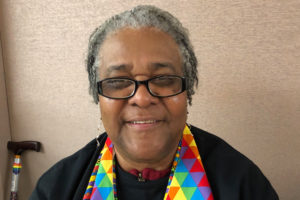The United Methodist Church teetered on the brink of breakup Monday after more than half the delegates at an international conference voted to maintain bans on same-sex weddings and ordination of gay clergy.
Their favored plan, if formally approved, could drive supporters of LGBT inclusion to leave America’s second-largest Protestant denomination.
A final vote on rival plans for the church’s future won’t come until Tuesday’s closing session, and the outcome remains uncertain. But the preliminary vote Monday showed that the Traditional Plan, which calls for keeping the LGBT bans and enforcing them more strictly, had the support of 56 percent of the more than 800 delegates attending the three-day conference in St. Louis.
The primary alternative proposal, called the One Church Plan, was rebuffed in a separate preliminary vote, getting only 47 percent support. Backed by a majority of the church’s Council of Bishops in hopes of avoiding a schism, it would leave decisions about same-sex marriage and ordination of LGBT clergy up to regional bodies and would remove language from the church’s law book asserting that “the practice of homosexuality is incompatible with Christian teaching.”
Monday’s voting did not kill the One Church Plan but makes its prospects on Tuesday far more difficult.
As evidence of the deep divisions within the faith, delegates Monday approved plans that would allow disaffected churches to leave the denomination while keeping their property.
“This is really painful,” said David Watson, a dean and professor at United Theological Seminary in Dayton, Ohio, who was at the gathering. “Our disagreement has pitted friend against friend, which no one wanted.”
Formed in a merger in 1968, the United Methodist Church claims about 12.6 million members worldwide, including nearly 7 million in the U.S. While other mainline Protestant denominations, such as the Episcopal and Presbyterian (U.S.A.) churches, have embraced the two gay-friendly practices, the Methodist church still officially bans them, even though acts of defiance by pro-LGBT clergy have multiplied and talk of a possible breakup has intensified.
The strong showing for the Traditional Plan reflects the fact that the UMC, unlike other mainstream Protestant churches in the U.S., is a global denomination. About 43 percent of the delegates in St. Louis are from abroad, mostly from Africa, and overwhelmingly support the LGBT bans.

Althea Spencer Miller, 63, assistant professor of New Testament at Drew University Theological School in New Jersey, and a pastor, poses for picture Monday, Feb. 25, 2019, at a national Methodist conference in St. Louis. Miller, who identifies as lesbian, said the United Methodist Church has an opportunity to show that “God’s kingdom is a kingdom of such diversity” by opening the door to same-sex marriage and LGBT ministers. The potentially divisive vote will be Tuesday. (AP Photo/Jim Salter)
“We Africans are not children in need of Western enlightenment when it comes to the church’s sexual ethics,” the Rev. Jerry Kulah, dean at a Methodist theology school in Liberia, said in a speech over the weekend. “We stand with the global church, not a culturally liberal church elite in the U.S.”
The Africans have some strong allies among U.S. conservatives, including the Rev. John Miles II, senior pastor of First United Methodist Church in Jonesboro, Arkansas, who opposes same-sex marriage and gays in the pulpit.
“I have a very difficult time even though I have gays in my family and in my church,” he said. “I know it grieves them and it grieves me to grieve them. But it’s just what we believe is the truth.”
In recent years, the church’s enforcement of its LGBT bans has been inconsistent. Some clergy members have conducted same-sex marriages or come out as gay from the pulpit. In some cases, the church has filed charges against clergy who violated the bans, yet the denomination’s Judicial Council has ruled against the imposition of mandatory penalties, which typically called for an unpaid suspension of at least one year.
The Traditional Plan would require stricter and more consistent enforcement.
Among the outspoken supporters of the more permissive One Church Plan was the Rev. Adam Hamilton, a pastor in Leawood, Kansas, who said it offered a way for Methodists “to live together — conservatives, centrists and progressives — despite our differences.”
For LGBT Methodists, it is a time of anxiety.
“For me it’s about who’s in God’s love, and nobody’s left out of that,” said Lois McCullen Parr, 60, a church elder from Albion, Michigan, who identifies as bisexual and queer. “The Gospel I understand said Jesus is always widening the circle, expanding the circle, so that everyone’s included.”
